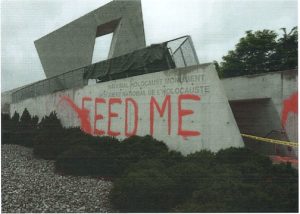Decades-old anti-Semitic restrictions in real estate transactions that still exist on paper in Quebec should be stricken from land deeds, the Centre for Israel and Jewish Affairs (CIJA) says.
The demand comes after the existence of such a condition forbidding sale to Jews by a long-ago vendor was recently brought to light in the town of Léry, Que., south of Montreal.
Real estate broker Anne-Marie Ashcroft was astonished to find that such a clause, known as a servitude, was attached to a lakefront house she was preparing to sell for a client in Léry, which is on the south shore of Lac St-Louis, west of Châteauguay, Que. It dated back to 1918.
Although legally unenforceable today, she believes such clauses should be removed from new deeds of sale or certificates of location as a matter of course, rather than requiring the seller to take the matter to court.
CIJA applauded Ashcroft for bringing the clause’s existence to public attention.
“This isn’t the first case in which property owners have been affected by such anti-Semitic restrictions dating back to a bygone era,” stated CIJA Quebec vice-president Eta Yudin.
“These covenants, common throughout North America until the 1950s, have since been invalidated by the Supreme Court of Canada and there is no reason for them to remain on paper.”
A similar discriminatory clause came to light in January in St-Jean-sur-Richelieu, Que., southeast of Montreal.
Carl Nadeau, the owner since 1994 of a property in that city was surprised to discover that the farmer who sold a large tract of land in the mid-1960s to be subdivided for residential development included a restriction that it not b*e sold to Jews. Today, there are about 350 homes in that area. Nadeau had gone to court over another matter last year when he found out about the clause.
In December, a Quebec Superior Court judge ordered the local land registry office to expunge the discriminatory condition from its records within 30 days, citing both the Canadian and Quebec rights charters. The office is under provincial jurisdiction.
Ashcroft said the onus should not be on sellers to go to the expense and effort of going to court to have such clauses struck.
“Notaries should be obligated to do something when they see something so against charter rights,” she said.
Yudin thinks municipalities also have a role.
“We urge the city of Léry to follow St-Jean-sur-Richelieu’s example in encouraging residents affected by such covenants to have them officially stricken from their deeds.
“CIJA continues to monitor such cases and is exploring ways to limit the bureaucratic hurdles that such amendments entail for affected property owners.”
On Feb. 24, Nicky Cayer, a spokesperson for Quebec Justice Minister Sonia LeBel, responded to the issue.
“Our government needs to do a comprehensive analysis to assess what would be the best collective remedy for this worrisome situation,” she said.







